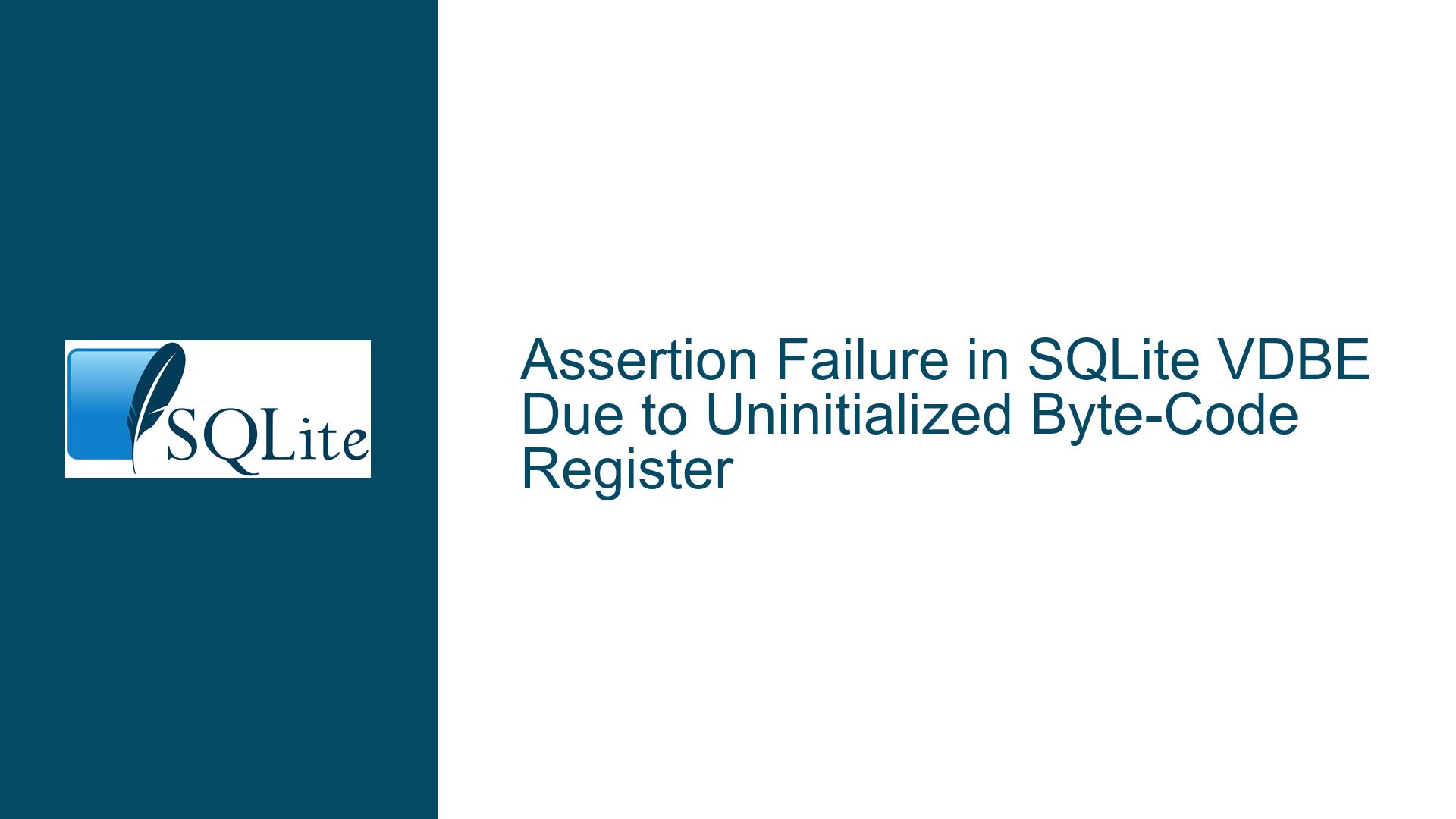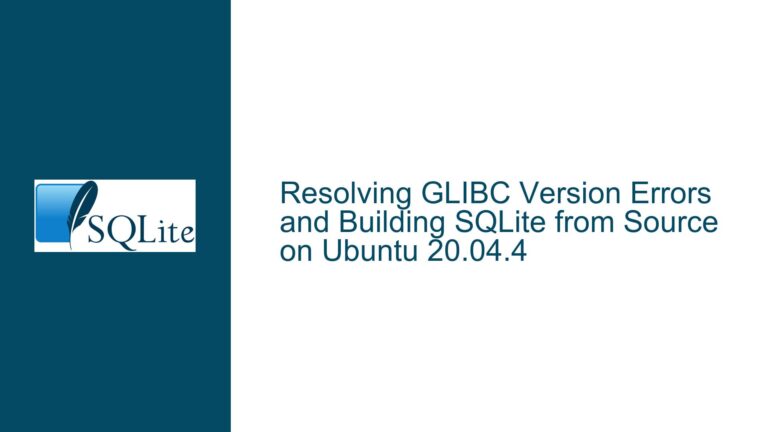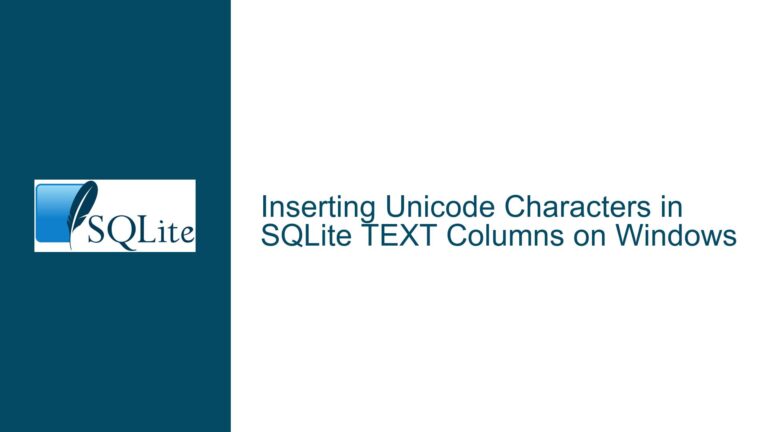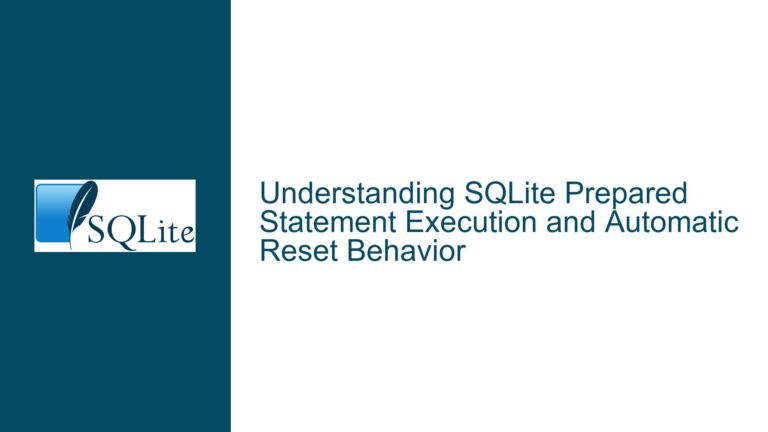Assertion Failure in SQLite VDBE Due to Uninitialized Byte-Code Register
Issue Overview: Assertion Failure in SQLite VDBE Execution
The core issue revolves around an assertion failure in the SQLite Virtual Database Engine (VDBE) when executing a specific query involving row-value comparisons and LEFT JOIN operations. The assertion failure occurs in the sqlite3VdbeExec function, specifically at the point where the VDBE attempts to validate a memory register using the memIsValid(&aMem[pOp->p1]) assertion. This assertion ensures that the memory register being accessed is properly initialized before use. However, in this case, the register is accessed before initialization, triggering the assertion failure.
The problematic query involves a LEFT JOIN between two tables, a and b, with a row-value comparison in the WHERE clause. The query also includes a subquery that further complicates the execution path. The issue manifests only when SQLite is compiled with the SQLITE_DEBUG flag enabled, as the assertion is part of the debugging infrastructure. In release builds, the assertion is absent, and the query executes without crashing, albeit with a potential risk of incorrect results.
The root cause of the issue lies in the byte-code generation and execution logic of the VDBE. Specifically, the byte-code register corresponding to the row-value comparison is not properly initialized before being accessed. This uninitialized access is a logical error in the VDBE’s byte-code execution rather than a memory safety issue. The byte-code registers are pre-initialized to NULL, so no memory corruption or undefined behavior occurs. However, the logical flaw can lead to incorrect query results under certain conditions.
The issue was traced back to a specific commit (ddb5f0558c445699) that introduced support for row-value comparisons in SQLite. This commit inadvertently introduced a regression in the byte-code generation logic, leading to the uninitialized register access. The problem was further exacerbated by subsequent commits, making it difficult to bisect and identify the exact point of regression.
Possible Causes: Uninitialized Byte-Code Register in Row-Value Comparisons
The assertion failure is caused by an uninitialized byte-code register in the VDBE during the execution of a query involving row-value comparisons. The following factors contribute to this issue:
Row-Value Comparison Logic: The introduction of row-value comparisons in SQLite added complexity to the byte-code generation and execution logic. Row-value comparisons require the VDBE to handle multiple values as a single unit, which involves additional byte-code instructions and register management. The regression in this logic led to the uninitialized register access.
LEFT JOIN Semantics: The use of a LEFT JOIN in the query further complicates the byte-code generation. In a LEFT JOIN, the right table’s columns can be NULL if no matching row is found. The VDBE must handle these NULL values correctly, which requires careful initialization of the corresponding byte-code registers. The failure to initialize these registers before access triggers the assertion.
Subquery Execution: The presence of a subquery in the WHERE clause adds another layer of complexity. The subquery’s result must be compared with the row-value from the main query, requiring additional byte-code instructions. The interaction between the subquery execution and the row-value comparison logic likely contributed to the uninitialized register issue.
Debugging Infrastructure: The issue is only visible when SQLite is compiled with the
SQLITE_DEBUGflag, as the assertion is part of the debugging infrastructure. In release builds, the assertion is absent, and the query executes without crashing. However, the underlying logical flaw remains, potentially leading to incorrect results.Bisecting Challenges: The issue was difficult to bisect due to the nature of the regression. The problematic commit (
ddb5f0558c445699) introduced the row-value comparison feature, but subsequent commits further modified the byte-code generation logic. This made it challenging to pinpoint the exact commit that introduced the regression.
Troubleshooting Steps, Solutions & Fixes: Addressing the Uninitialized Register Issue
To resolve the assertion failure and ensure correct query execution, the following steps were taken:
Identifying the Root Cause: The first step was to identify the root cause of the assertion failure. This involved analyzing the byte-code generated for the problematic query and tracing the execution path in the VDBE. The analysis revealed that the byte-code register corresponding to the row-value comparison was not properly initialized before being accessed.
Fixing the Byte-Code Generation Logic: The fix involved modifying the byte-code generation logic to ensure that all registers are properly initialized before being accessed. This required changes to the code responsible for generating byte-code instructions for row-value comparisons and LEFT JOIN operations. The fix ensured that the registers were initialized to NULL before being used in the comparison.
Validating the Fix: The fix was validated by running the problematic query and verifying that the assertion failure no longer occurred. Additionally, the query’s results were checked to ensure correctness. The fix was also tested with a variety of other queries involving row-value comparisons and LEFT JOINs to ensure that no regressions were introduced.
Commit and Integration: The fix was committed to the SQLite source code repository under the check-in
4db5217a28ce767f. This commit addressed the uninitialized register issue and ensured that the byte-code generation logic correctly handled row-value comparisons and LEFT JOIN operations.Testing and Verification: Extensive testing was performed to verify the fix. This included running the problematic query with the
SQLITE_DEBUGflag enabled to ensure that the assertion failure no longer occurred. Additionally, the query’s results were compared against expected results to ensure correctness. The fix was also tested with a variety of other queries to ensure that no regressions were introduced.Documentation and Communication: The issue and its resolution were documented in the SQLite forum and source code repository. This included a detailed explanation of the root cause, the steps taken to fix the issue, and the validation process. The documentation ensured that other developers and users were aware of the issue and its resolution.
Preventing Future Regressions: To prevent similar issues in the future, additional tests were added to the SQLite test suite. These tests specifically targeted row-value comparisons and LEFT JOIN operations to ensure that the byte-code generation logic correctly handles these cases. The tests were designed to catch any regressions in the byte-code generation logic before they could be introduced into the codebase.
Community Feedback: The SQLite community was encouraged to provide feedback on the fix and report any issues they encountered. This feedback was used to further validate the fix and ensure that it addressed all related issues. The community’s involvement was crucial in identifying and resolving the issue.
By following these steps, the assertion failure in the SQLite VDBE was successfully resolved, ensuring correct query execution and preventing potential regressions. The fix demonstrated the importance of thorough testing and validation in maintaining the reliability and correctness of SQLite.






